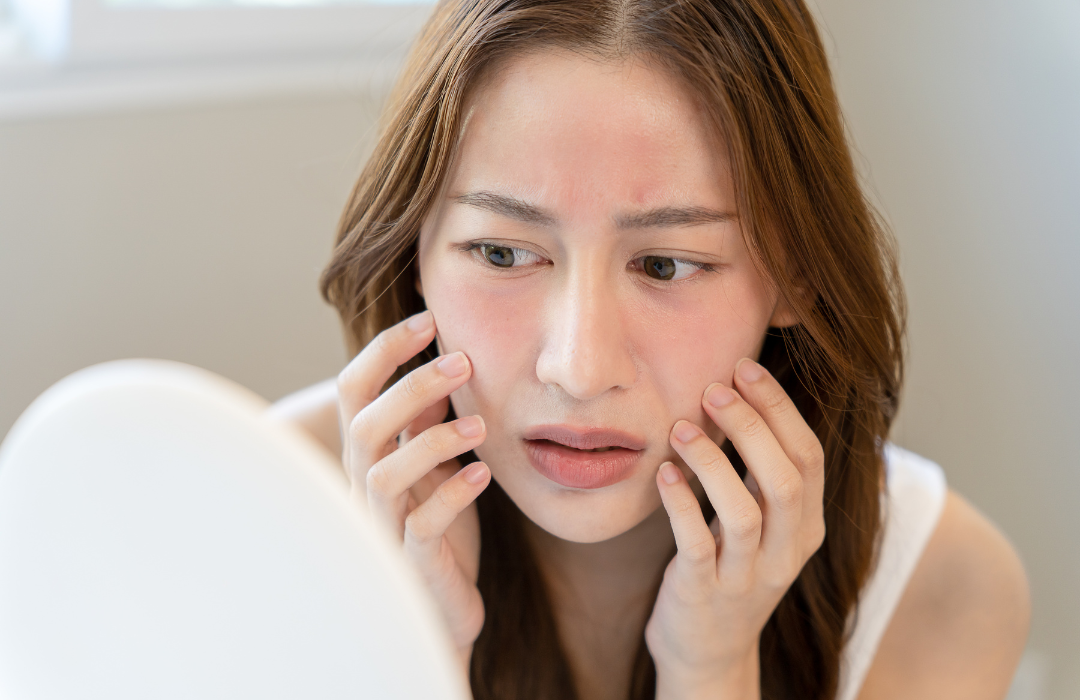Note: As an affiliate, I earn a small commission from qualifying purchases made through links in this post. This helps support my work, but it won't cost you any extra. For more information, please read my full disclosure here.
This post will help you spot clear signs of a damaged skin barrier and provide practical tips to repair it!
Have you ever had those days when your skin just doesn’t feel quite like its usual, healthy self? Maybe it’s feeling dry, itchy, or irritated, and you’re left wondering what’s going on.
Well, these discomforts could be clear signs that your skin’s protective barrier is damaged.
In this blog, I’m going to dive into the topic of your skin’s protective barrier. This barrier acts as a shield for your body, keeping it safe from potential harm. It’s not so different from the way a shield protects a knight.
I’ll explain things in a straightforward and friendly way, so you can easily understand what’s happening with your skin and how to take better care of it.
What Is Your Skin Barrier?
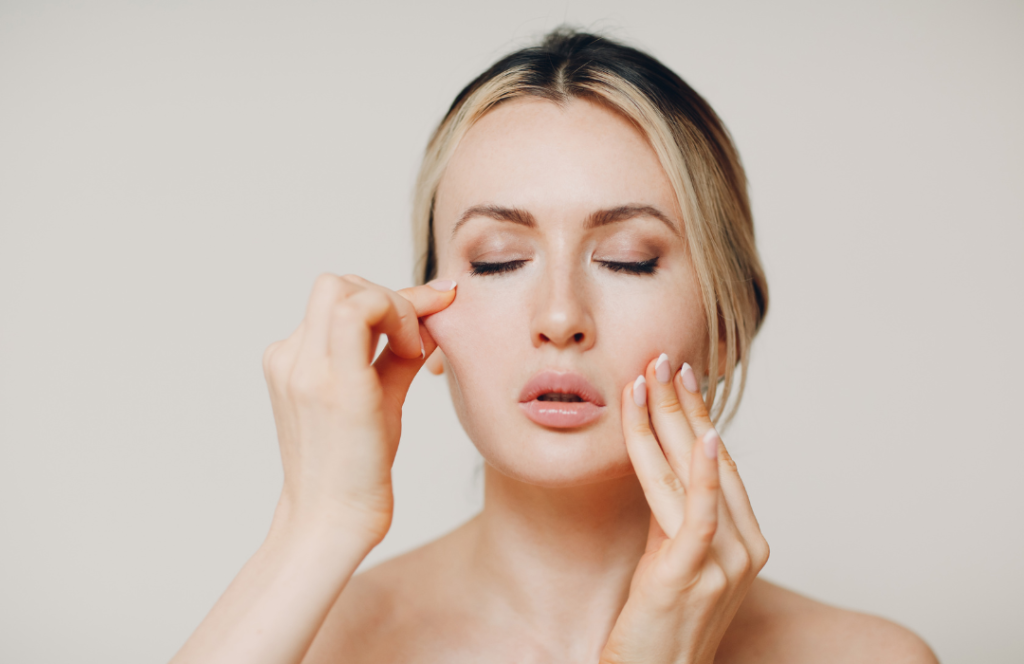
As explained by a dermatologist from the Cleveland Clinic, your skin barrier is the bodyguard of your skin. It’s not a living part of your skin; it’s made up of dead cells, lipids (which are natural fats), proteins, and fats.
Together, they create a protective team that acts as a shield to protect your skin from outside stuff. This team’s main job is to help your skin keep its moisture and keep away bad things like chemicals and bacteria.
This skin barrier is in the top layer of your skin, known as the “stratum corneum.” To make it simple, you can think of it like a strong wall.
Inside this wall, you have tough skin cells called “corneocytes,” and they are held together by natural fats found in your skin, like ceramides, cholesterol, and fatty acids.
Interestingly, these same fats are also found in many skincare products, and they help keep your skin healthy. So, understanding your skin’s protective defender is a big step in having great skin.
How to Know If Your Skin Barrier Is Damaged
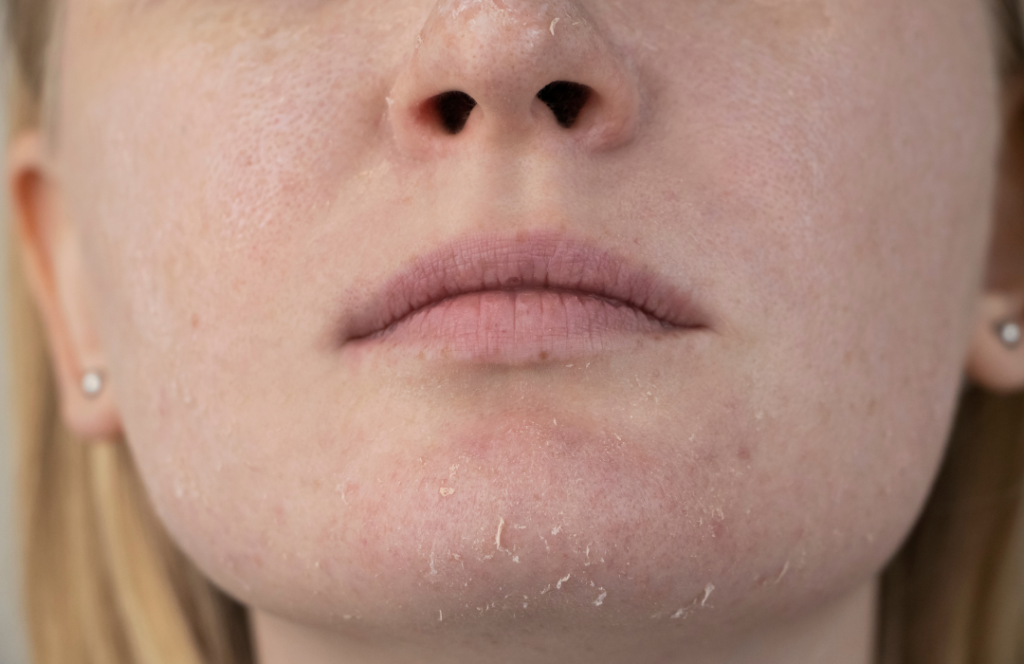
Signs to know that your skin barrier is damaged:
1. Dryness and flakiness: When your skin barrier is damaged, it struggles to hold onto moisture, leaving your skin feeling dry and looking flaky.
2. Itching and irritation: If you find yourself itching your skin often or experiencing discomfort that’s similar to the feeling of a sunburn, it could mean your skin barrier is not at its best.
3. Increased sensitivity: A weakened skin barrier makes your skin more sensitive, so it might react strongly to things it usually doesn’t mind. For example, products you’ve used for years without any issues might now cause a burning or stinging sensation.
4. Breakouts and blemishes: A damaged skin barrier can allow more harmful stuff to get through, leading to acne and breakouts.
5. Tightness and discomfort: You might feel like your skin is too tight or uncomfortable. A healthy skin barrier ensures your skin feels comfortable, but when it’s damaged, it can make your skin feel uneasy.
6. Increased allergies: A damaged skin barrier can make your skin more prone to allergies and skin reactions, similar to how a weakened immune system can make you more susceptible to getting sick.
7. Redness and inflammation: Your skin may appear redder than usual, like a sunburn, and show signs of puffiness and swelling.
8. Rough texture: When your skin doesn’t feel smooth to the touch and instead feels rough, it’s often telling you that your skin barrier might be struggling.
9. Increased wrinkles and fine lines: A damaged skin barrier can lead to an acceleration in the formation of wrinkles and fine lines on your skin.
What Causes a Damaged Skin Barrier
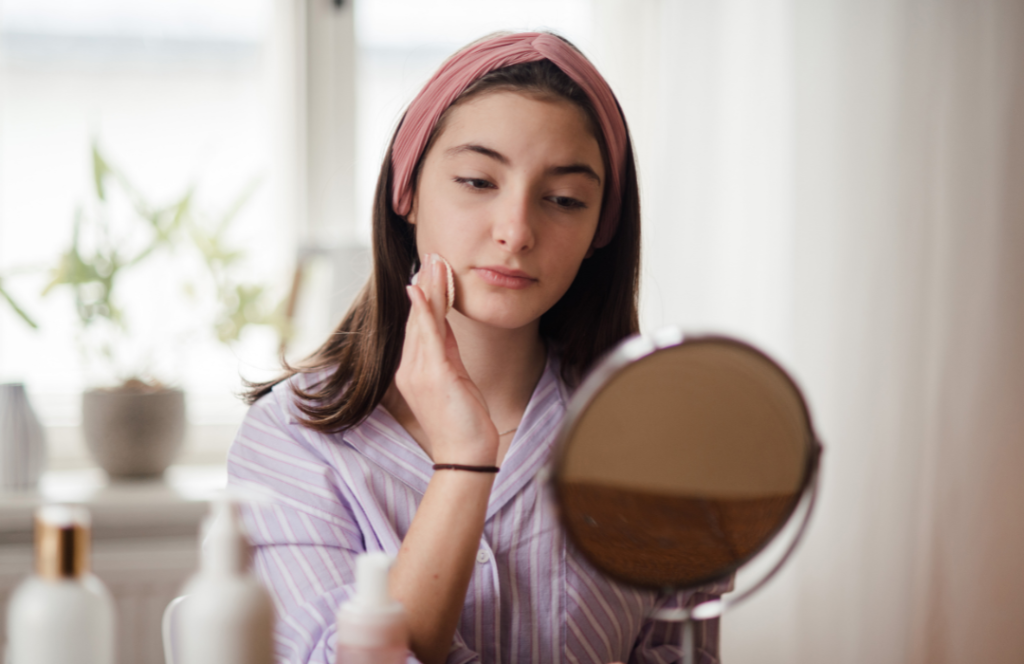
1. Harsh cleansers
Using strong cleansers with lots of chemicals or soap can harm your skin barrier. These cleansers take away the natural oils that protect your skin. When those oils are gone, your skin can lose moisture more easily and become sensitive to things that bother it.
2. Over-exfoliation
Scrubbing your skin too hard or too often, like when you rub with rough scrubs or brushes, can mess up your skin barrier.
Exfoliating your skin is good, but it’s essential to do it gently and not too much because overdoing it can remove not only the dead skin but also the protective layer that keeps your skin safe.
Some exfoliating products have AHA or BHA, which can be effective but need to be used wisely to avoid harming the skin barrier.
3. Overuse of strong products
If you put lots of products on your skin with strong things like alcohol, super strong acids, or heavy fragrances, it can throw off your skin’s balance. These things can be too harsh and lead to irritation and damage.
4. Spend a long time in the sun
Spending too much time in the sun without protection or sunscreen can hurt your skin barrier. The sun’s rays can weaken your skin’s natural defenses, causing issues like sunburn and making your barrier not as strong.
5. Tough weather
Extreme weather conditions, like very cold days or strong winds, can be hard on your skin. They can dry out your skin and make it more likely to get damaged.
6. Unhealthy habits
Things like eating a poor diet, not drinking enough water, and smoking can make your skin barrier weaker. Smoking, in particular, is a significant detriment to your skin barrier, as it can impair the skin’s ability to repair and protect itself. In fact, Medical News says smokers have less vitamin D in their bodies. Vitamin D helps your skin barrier stay healthy and fix itself when needed.
7. Aging
As we get older, our skin goes through changes, and one of those changes is the weakening of the skin barrier. It doesn’t hold moisture as well and can’t protect your skin as it used to.
How to Repair a Damaged Skin Barrier
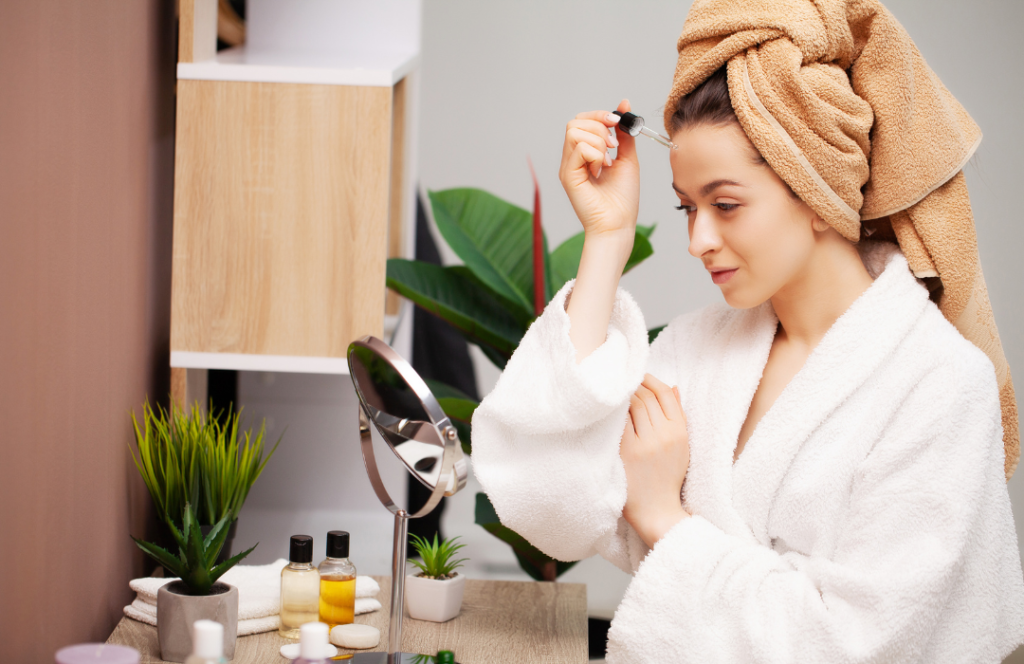
1. Use gentle cleansing
To begin the journey of repairing your skin barrier, start with a mild, soap-free cleanser that has a pH between 4.0 and 5.0, as recommended by researchers.
Avoid hot water, as it can strip your skin of its natural oils. Instead, use lukewarm water to gently wash your face.
After cleansing, pat your skin dry with a soft towel, avoiding any harsh scrubbing. This mild approach will help protect your skin’s natural balance while preparing it for the repair process.
2. Avoid hash products
Stay away from skincare items that have strong acids, strong scents, or alcohol. If you’re using products with AHA or BHA, it’s a good idea to either use them less often (maybe 1-2 times a week) or avoid them for a while. Instead, choose gentle, fragrance-free products made for sensitive skin.
3. Protect yourself from the sun
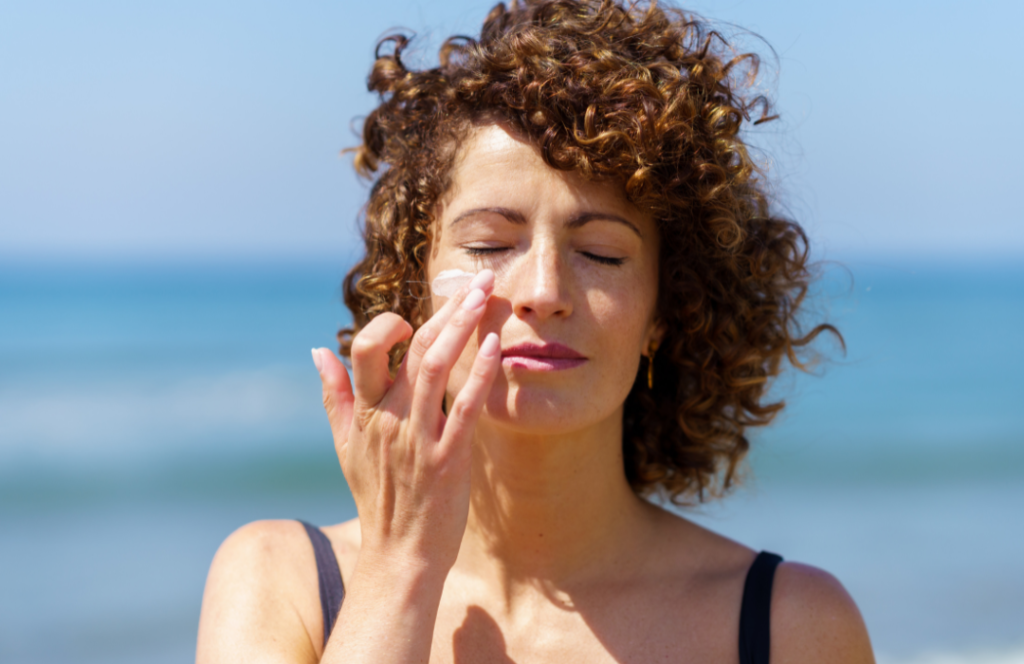
Sunscreen is your best friend when it comes to repairing a damaged skin barrier. Make it a habit to use a broad-spectrum sunscreen with at least SPF 30 or higher every day.
UV rays can cause further damage to your skin, making it harder for the barrier to recover. They can lead to issues like sunburn, premature aging, and even skin cancer in the long run. By applying sunscreen, you create a protective shield against these harmful rays, giving your skin barrier the breathing room it needs to repair itself.
Additionally, wearing protective clothing, like wide-brimmed hats and long sleeves, and seeking shade when the sun is at its strongest can provide extra layers of defense.
4. Limit exfoliation
Limit your exfoliation routine to once or twice a week. If you still want to exfoliate regularly, choose exfoliants with mild ingredients.
For instance, you can pick a gentle scrub with small, soft particles. These are gentle on your skin and can still remove dead skin cells effectively. Alternatively, if you prefer, you can opt for a milder AHA or BHA product by using a lower concentration.
5. Avoid steaming your face
When you have a damaged skin barrier, it means your skin’s protective layer is already weakened.
Steaming exposes your skin to hot, moist air, which can strip away the natural oils and moisture that are crucial for your skin’s recovery. As a result, your skin can become even drier and more prone to irritation.
Moreover, the heat from steaming can dilate your blood vessels, causing redness and potentially aggravating existing inflammation.
So, steaming may offer short-term relaxation, but it’s not a good idea when your skin barrier is damaged.
6. Apply moisturizer
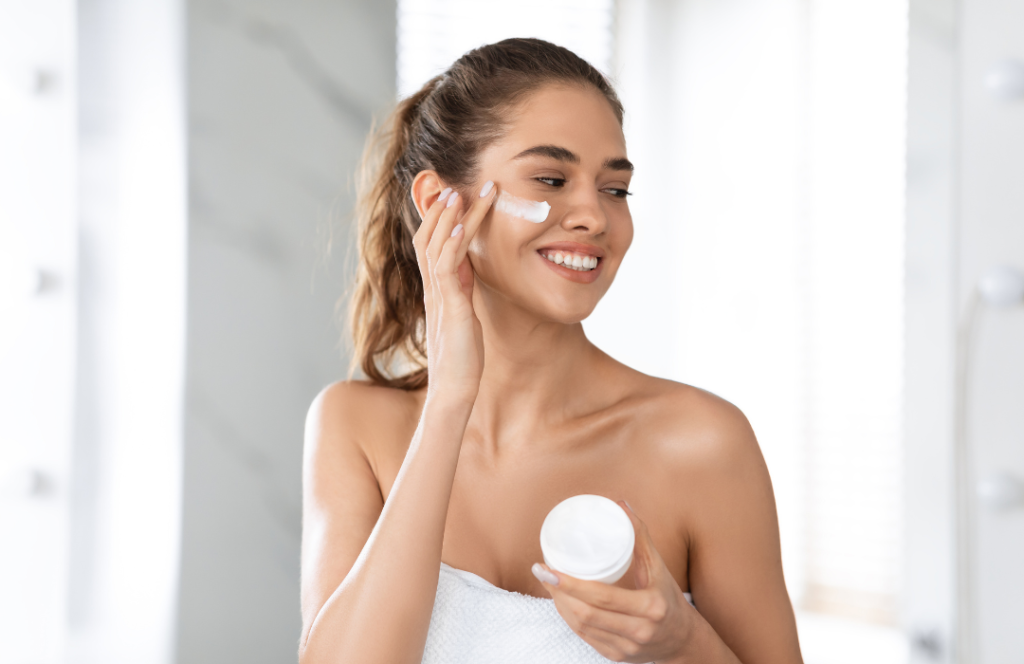
It’s important to use a moisturizer regularly to help fix your damaged skin barrier. It keeps your skin well-hydrated and creates a good environment for the healing process.
When choosing a moisturizer, look for one that’s made to repair and strengthen your skin barrier. Find a product with ingredients like hyaluronic acid, which is excellent at trapping moisture in your skin, or ceramides, which are the building blocks of your skin’s protective wall.
If your skin barrier is severely damaged, think about using a thicker, creamier moisturizer. This can give your skin an extra layer of protection and more moisture.
7. Maintain a healthy diet
A balanced diet with plenty of vitamins and antioxidants can aid in skin repair. Foods rich in omega-3 fatty acids, like fish and nuts, can help maintain a healthy skin barrier.
What you eat plays a significant role in helping your skin barrier heal. A balanced diet packed with a variety of vitamins and antioxidants is your skin’s best friend in the repair process.
Consider incorporating foods that are rich in omega-3 fatty acids into your meals. These can include fatty fish like salmon, mackerel, or nuts like almonds and walnuts. Omega-3 fatty acids are really important for your skin barrier because they help maintain its strength and resilience. They act as natural hydrators, keeping your skin moist and aiding in the repair process.
Additionally, ensure you’re getting a range of vitamins from fruits and vegetables. Vitamin E, found in foods like spinach, nuts, and seeds, can work wonders for your skin. It’s an antioxidant that helps protect your skin from harmful free radicals, which can weaken your skin barrier.
8. Drink enough water

Drinking enough water is crucial for your skin. It’s giving your skin a big drink from the inside. This hydration is super important for keeping your skin healthy.
When you’re well-hydrated, your skin stays plump and bouncy, less likely to get dry and irritated. Water helps important nutrients get to your skin cells, so they can fix and renew themselves.
9. Give you skin barrier time to heal
Repairing your skin barrier is a journey that requires both time and patience. You see, your skin barrier doesn’t heal overnight; it takes time to mend and become stronger. So, it’s essential to be patient and not expect instant results.
Consistency is key in this process. We often want quick results and might be tempted to try new products when we don’t see immediate changes.
However, it’s best to stick with a simple skincare routine. Frequent product changes can confuse your skin and slow down the healing of your skin barrier.
10. Consult a dermatologist when necessary
While self-care and a gentle approach are effective for most cases of damaged skin barriers, sometimes the damage can be more severe or persistent. In such cases, it’s essential to seek the expertise of a dermatologist.
Dermatologists have the knowledge and experience to pinpoint the exact issues with your skin barrier. They can provide specialized guidance and treatments that are tailored to your skin’s unique needs.
These treatments might involve using special medicines, skincare products that are not available over the counter, or even advanced procedures to speed up the healing process.
If your skin barrier damage seems tough to tackle on your own, don’t hesitate to connect with a dermatologist.
Conclusion
I hope this blog has helped you understand the importance of your skin barrier and how to protect it. Recognizing your skin type, identifying signs of a damaged skin barrier, and learning how to maintain skin health are essential steps in your skincare journey.
In this journey, remember that preventing water loss from your skin is crucial in maintaining its natural protection. So, whether you’ve been looking for ways to address damaged skin or simply enhance your skin’s well-being, these tips should guide you in the right direction.
More About Skincare Topic:
The Truth About Retinol Side Effects: What You Need To Know
Face Oil Vs. Moisturizer: Which One Is Better For Your Skin?

